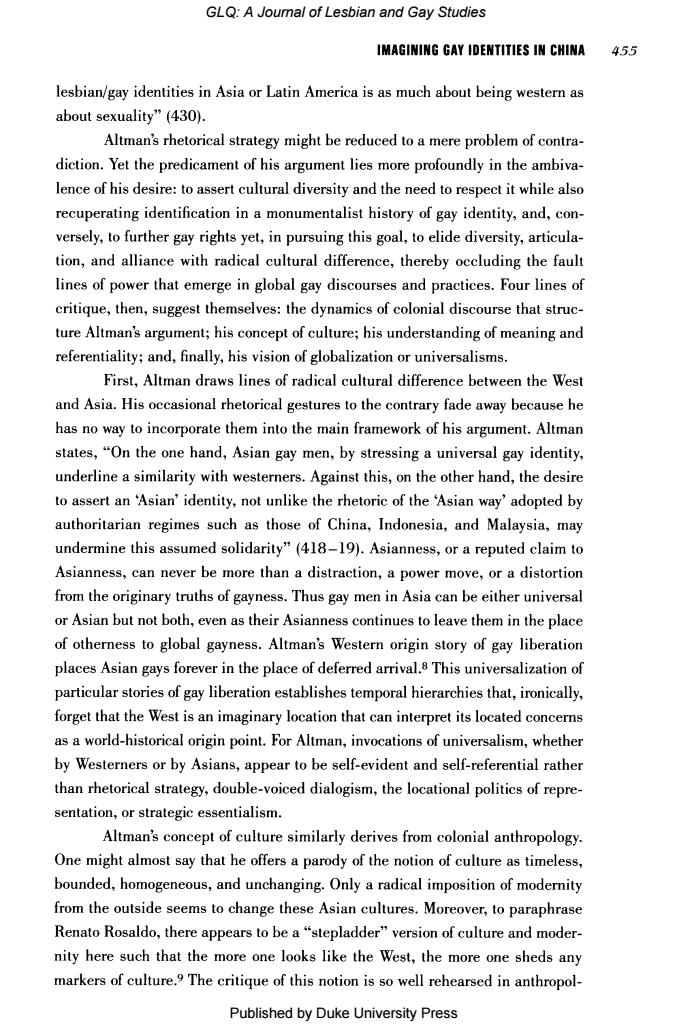正在加载图片...

GLQ:A Joumal of Lesbian and Gay Studies IMAGINING GAY IDENTITIES IN CHINA 4.55 lesbian/gay identities in Asia or Latin America is as much about being western as about sexuality"(430). Altman's rhetorical strategy might be reduced to a mere problem of contra- diction.Yet the predicament of his argument lies more profoundly in the ambiva- lence of his desire:to assert cultural diversity and the need to respect it while also recuperating identification in a monumentalist history of gay identity,and,con- versely,to further gay rights yet,in pursuing this goal,to elide diversity,articula- tion,and alliance with radical cultural difference,thereby occluding the fault lines of power that emerge in global gay discourses and practices.Four lines of critique,then,suggest themselves:the dynamics of colonial discourse that struc- ture Altman's argument;his concept of culture;his understanding of meaning and referentiality;and,finally,his vision of globalization or universalisms. First,Altman draws lines of radical cultural difference between the West and Asia.His occasional rhetorical gestures to the contrary fade away because he has no way to incorporate them into the main framework of his argument.Altman states,"On the one hand,Asian gay men,by stressing a universal gay identity, underline a similarity with westerners.Against this,on the other hand,the desire to assert an 'Asian'identity,not unlike the rhetoric of the 'Asian way'adopted by authoritarian regimes such as those of China,Indonesia,and Malaysia,may undermine this assumed solidarity"(418-19).Asianness,or a reputed claim to Asianness,can never be more than a distraction,a power move,or a distortion from the originary truths of gayness.Thus gay men in Asia can be either universal or Asian but not both,even as their Asianness continues to leave them in the place of otherness to global gayness.Altman's Western origin story of gay liberation places Asian gays forever in the place of deferred arrival.8 This universalization of particular stories of gay liberation establishes temporal hierarchies that,ironically, forget that the West is an imaginary location that can interpret its located concerns as a world-historical origin point.For Altman,invocations of universalism,whether by Westerners or by Asians,appear to be self-evident and self-referential rather than rhetorical strategy,double-voiced dialogism,the locational politics of repre- sentation,or strategic essentialism. Altman's concept of culture similarly derives from colonial anthropology. One might almost say that he offers a parody of the notion of culture as timeless, bounded,homogeneous,and unchanging.Only a radical imposition of modernity from the outside seems to change these Asian cultures.Moreover,to paraphrase Renato Rosaldo,there appears to be a"stepladder"version of culture and moder- nity here such that the more one looks like the West,the more one sheds any markers of culture.9 The critique of this notion is so well rehearsed in anthropol- Published by Duke University PressIMAGINING GAY IDENTITIES IN CHINA 455 lesbian/gay identities in Asia or Latin America is as much about being western as about sexuality” (430). Altman’s rhetorical strategy might be reduced to a mere problem of contradiction. Yet the predicament of his argument lies more profoundly in the ambivalence of his desire: to assert cultural diversity and the need to respect it while also recuperating identification in a monumentalist history of gay identity, and, conversely, to further gay rights yet, in pursuing this goal, to elide diversity, articulation, and alliance with radical cultural difference, thereby occluding the fault lines of power that emerge in global gay discourses and practices. Four lines of critique, then, suggest themselves: the dynamics of colonial discourse that structure Altman’s argument; his concept of culture; his understanding of meaning and referentiality ; and, finally, his vision of globalization or universalisms. First, Altman draws lines of radical cultural difference between the West and Asia. His occasional rhetorical gestures to the contrary fade away because he has no way to incorporate them into the main framework of his argument. Altman states, “On the one hand, Asian gay men, by stressing a universal gay identity, underline a similarity with Westerners. Against this, on the other hand, the desire to assert an ‘Asian’ identity, not unlike the rhetoric of the ‘Asian way’ adopted by authoritarian regimes such as those of China, Indonesia, and Malaysia, may undermine this assumed solidarity” (418-19). Asianness, or a reputed claim to Asianness, can never be more than a distraction, a power move, or a distortion from the originary truths of gayness. Thus gay men in Asia can be either universal or Asian but not both, even as their Asianness continues to leave them in the place of otherness to global gayness. Altman’s Western origin story of gay liberation places Asian gays forever in the place of deferred arrival.8 This universalization of particular stories of gay liberation establishes temporal hierarchies that, ironically, forget that the West is an imaginary location that can interpret its located concerns as a world-historical origin point. For Altman, invocations of universalism, whether by Westerners or by Asians, appear to be self-evident and self-referential rather than rhetorical strategy, double-voiced dialogism, the locational politics of representation, or strategic essentialism. Altman’s concept of culture similarly derives from colonial anthropology. One might almost say that he offers a parody of the notion of culture as timeless, bounded, homogeneous, and unchanging. Only a radical imposition of modernity from the outside seems to change these Asian cultures. Moreover, to paraphrase Renato Rosaldo, there appears to be a “stepladder” version of culture and modernity here such that the more one looks like the West, the more one sheds any markers of culture.9 The critique of this notion is so well rehearsed in anthropolGLQ: A Journal of Lesbian and Gay Studies Published by Duke University Press